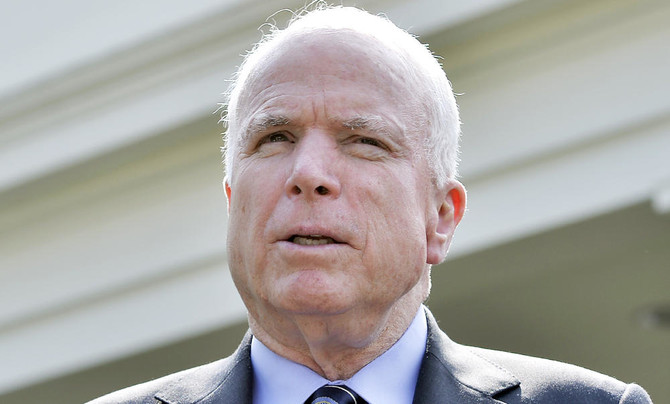WASHINGTON: Two weeks before it adjourns for the end-of-year recess, the 114th US Congress is expected to take on amendments proposed by Republican Senators John McCain and Lindsey Graham to the recently-enacted Justice Against Sponsors of Terrorism Act (JASTA), in order to contain the legal backlash it could have on the United States.
The conversation to amend JASTA, despite the overwhelming vote that helped pass the bill and overrode US President Barack Obama’s veto, started promptly in Congress after its passage on Sept. 28.
That is in part because of the controversial aspect of the law that allows US courts to waive claims of “sovereign immunity,” and gives 9/11 families the ability to sue the Saudi government and collect damages for any alleged role they see in the attacks.
This in return could open a legal Pandora’s box against the United States, with foreign governments suing American diplomats or the military over drone attacks or secret prisons.
In a separate development on Thursday, the Senate passed a 10-year extension of sanctions against Iran, sending the measure to the White House for Obama to sign into law. The measure passed by 99-0. It passed the House of Representatives nearly unanimously in November, and congressional aides said they expected Obama to sign it. The Iran Sanctions Act (ISA) will expire on Dec. 31 if not renewed.
The White House had not pushed for an extension, but had not raised serious objections. Members of Congress and administration officials said the renewal of the ISA would not violate the nuclear agreement with Iran reached last year.
“While we do not think that an extension of ISA is necessary, we do not believe that a clean extension would be a violation of the JCPOA (Iran deal),” a senior administration official was quoted as saying by Reuters. Iran’s Supreme Leader Ali Khamenei recently said the extension would breach the agreement, and threatened retaliation.
The McCain-Graham amendment
Meanwhile, with 15 days left before the Senate adjourns, McCain and Graham proposed fixes on the floor of the Senate on Wednesday aimed at containing the JASTA legal backlash. The amendment, as explained by Graham, would preserve sovereign immunity and target foreign governments only “if they knowingly engage with a terrorist organization directly or indirectly, including financing.”
Graham told his Senate colleagues: “If we don’t make this change, here’s what I fear: That other countries will pass laws like this and they will say that the United States is liable for engaging in drone attacks or other activity in the war on terror and haul us into court as a nation and haul the people that we give the responsibility to defend the nation into foreign courts.”
This warning was echoed by the White House, the CIA, and the State and Defense Departments prior to the passage of JASTA in September. McCain for his part warned of the fiscal damage that JASTA could inflict on US-Saudi relations.
Hinting at the risk of Saudi Arabia withdrawing $116.8 billion in holdings, he said: “If a nation that has significant investments in the United States of America — whether it be in the stock market or investments in many ways — and that country knows that it’s going to be sued and possibly have its assets frozen, any thinking government is going to withdraw those assets so that they cannot be frozen as the court proceedings went on.”
Fahad Nazer, a Washington-based political analyst who provides political consulting services to the Saudi Embassy in Washington but does not represent the Saudi government, told Arab News that the Graham-McCain amendment “indicates that some congressional leaders have realized that the ramifications of the law in its current form extend beyond potentially straining relations between Saudi Arabia and the United States.”
The legal ramifications that could target US diplomats, intelligence or military cadres has “leaders in Congress, in addition to the Obama administration itself, concerned about the potential of other nations to take retaliatory measures that could leave US diplomatic and military personnel open to litigation in court.”
Can JASTA amendments pass?
Despite the ramifications, however, the road remains very bumpy for the 114th Congress to be able to pass the JASTA amendments before the new Congress takes charge on Jan. 20, and as Republican President-elect Donald Trump is sworn into office.
Because of the transition period, known as the lame-duck session for this Congress, the law would require unanimous consent of the total of 100 senators for an amendment to pass, which is an uphill battle according to sources familiar with the JASTA negotiations. After the lame-duck session and the new Congress takes charge, congressional procedures mandate two-thirds of the legislatures to pass an amendment, not a unanimous vote.
Terry Strada, the national chair for 9/11 Families United for Justice Against Terrorism, which pushed and sponsored JASTA, was clear in her statement that the McCain-Graham amendment would be rejected.
“We have reviewed the language, and it is an absolute betrayal,” Strada said of the amendments, voicing confidence that the key sponsors of JASTA, Senators John Cornyn (Republican) and Chuck Schumer (Democrat), would block the effort.
Nazer points out that “the battle for amendments is likely to continue if the McCain-Graham push fails to pass,” adding that JASTA “potentially changes the way that nations conduct their relations with each other,” which “could create uncertainty and unpredictability, both of which make conducting foreign relations a more difficult task.”
Uphill battle to amend JASTA starts in US Congress
Uphill battle to amend JASTA starts in US Congress











